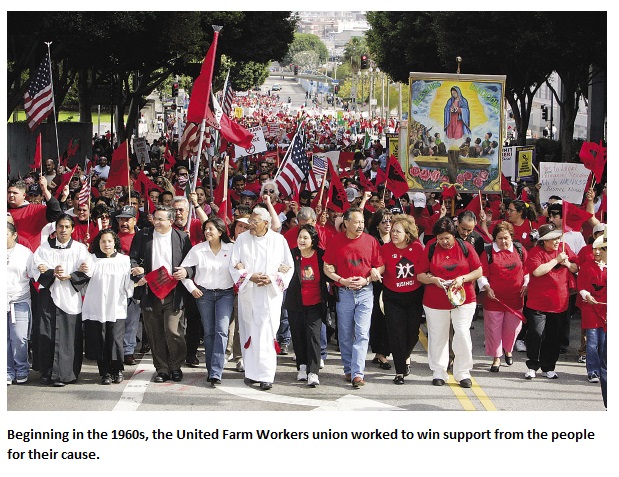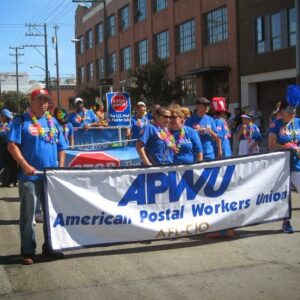December 23, 2014
We Must Make Our ‘Cause’ the People’s Cause!
(This article first appeared in the January-February 2015 issue of The American Postal Worker magazine.)
The APWU is gearing up for a major battle: The fight to win a good contract for our members, while we fight for a vibrant, public Postal Service for the people of the country. Negotiations are set to begin on Feb. 19, three months before the current Collective Bargaining Agreement expires on May 20.
Contract negotiations are always contentious, and 2015 will be no exception: Postal management is using a manufactured financial crisis to justify its disastrous “cut to survive” strategy, and many in Congress and on Wall Street are eager to dismantle the USPS so they can turn over the profitable pieces to their cronies in private industry.
”Despite the obstacles, I believe we can win a good contract,” said APWU President Mark Dimondstein.
“To be victorious, we will have to conduct our fight for a good contract very differently than we have in the past,” he said. “Negotiations will still go on at the bargaining table, but to be successful we must win support from the people of the country for our goals – good, stable postal jobs and a strong Postal Service that belongs to them. As postal workers, we understand that the demise of a strong, public Postal Service would mean the end of our jobs. But we must take that understanding a step further.
“We must make sure the people of the country realize that dismantling the nation’s postal system doesn’t only harm postal workers,” Dimondstein said. “It also robs the people of speedy delivery of their medicine, their online purchases, local newspapers, bill payments, letters and invitations. And it robs communities of a vital public service, secure jobs, a strong tax base, and important infrastructure.
“Despite the obstacles, I believe together we can win a good contract.”
-APWU President Mark Dimondstein
“We must make sure the people understand that our great national treasure has the potential to expand hours and services – to include postal banking, licenses and Internet services.
“To win support, we will need the active involvement of all APWU members – not just stewards and officers,” he added.
“We will ask all union members to speak out about the threat to the public Postal Service and how a contract that protects good jobs can also protect local post offices. We will ask members to take the message to community meetings, the places where they worship, and small business groups in their cities and towns.”
In 2012, the Chicago Teachers Union defied the odds and won a strike by uniting the demands of teachers with the needs of the students and parents they served, Dimondstein observed.
“We are not alone,” he pointed out. “Walmart workers are rising up, and fast food workers are demanding a living wage,” he added. “Our demands – like theirs – are just. And like the workers at McDonalds and Walmart, to win, we must take our case to the people of the country and ask for their support.”
“We also must make sure that we are united within our own ranks,” said Secretary-Treasurer Liz Powell, who is helping to lead the contract campaign. “We must make sure that more senior workers understand the importance of improving conditions for Postal Support Employees, and that new employees understand the importance of protecting retirement benefits. And we must strive together to end the three-tier pay structure that divides our workforce.”
In the coming weeks and months, union activists across the country will call on their co-workers to get involved by joining Contract Action Teams, wearing stickers, buttons and T-shirts, and by spreading the word to neighbors, friends and associates.
Will you answer the call?
Delegates: Build a Contract Campaign
In July 2014, delegates to the union’s National Convention approved a resolution instructing union leaders to conduct a contract campaign that mobilizes APWU members, our fellow postal workers, the labor movement, friends and concerned citizens in support of our contractual demands and in opposition to the priorities and policies of the Postal Service.
As preparations for the contract campaign got underway, the union’s National Executive Board and all officers domiciled at the union’s national office have signed a pledge that provides, in part, that the officers support “including the entire membership to help win a strong contract that will keep the Postal Service vibrant, with good union jobs, for years to come.”
The national officers have also pledged to assist locals and state organizations with worksite actions in support of bargaining and activities that may involve the public and the media.
An Unexpected Finding:
Young People Love the Postal Service Best
Few postal workers were surprised by a recent Gallup Poll that found that Americans rate the Postal Service highest among 13 government agencies – after all, the USPS routinely ranks at the top of such surveys.
But many people were surprised to learn that young people gave the Postal Service the highest rating: 81 percent of 18-29 year olds gave the USPS “excellent or good” marks. “The most curious finding in the poll is who likes USPS most,” the National Journal observed in an article about the survey.
“Pundits have convinced many people that the future of the Postal Service is bleak because young people consider it irrelevant,” APWU President Mark Dimondstein said, “but this poll shows the opposite is true.”
“All age groups gave solid approval ratings to the Postal Service,” Gallup noted, but young people gave the agency the best scores.
Sixty-five percent of respondents over 50 gave the Postal Service “excellent or good” marks, which exceeded the ratings they gave to all other federal government agencies ranked in the survey. Seventy-three percent of women and 70 percent of men rated the USPS as “excellent or good.” The poll, conducted Nov. 11-12, surveyed 1,020 adults in all 50 states by telephone.
“The results of the Gallup Poll demonstrate that the Postal Service is, indeed, a national treasure,” Dimondstein said. “The USPS won high marks, despite efforts by the Postmaster General and Board of Governors to dismantle it, degrade service standards, close mail processing plants, and despite ongoing threats to end Saturday mail delivery,” he said.
“It makes you wonder how much better the results would be if postal management truly embraced its mission and worked to improve rather than cut service.”
The survey results “could be good news for an organization that has been battered by bad publicity for quite some time,” Gallup wrote. Despite its difficulties, “the overall image of the agency has remained remarkably positive,” the polling company said. “This reservoir of goodwill may serve the Postal Service well as it strives to adapt to the changing world in which electronic communication and commerce are rapidly replacing the traditional mailed letter.”
“As the volume of letters has declined, the USPS has evolved to become as much a courier of packages as it is a way to send and receive first-class mail,” Time magazine wrote.
“In this day of rapidly advancing ecommerce, the survey shows that the future of the Postal Service could be very bright,” Dimondstein said.



